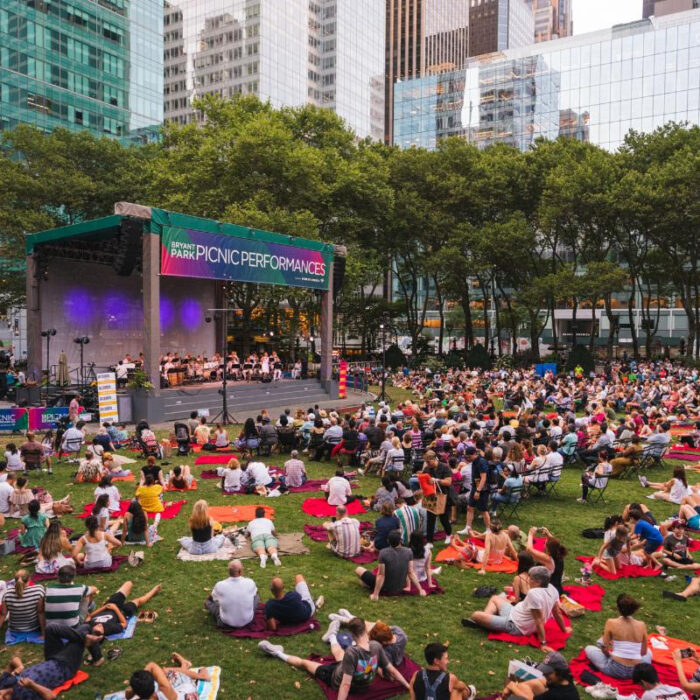
CAL PERFORMANCES 2022 Review: Sunday in the Park with Jamie Barton & Jake Heggie
Barton & Heggie Deliver Wonder and Fine Artistry
By Lois SilversteinOn April 3, 2022, CAL PERFORMANCES presented “Sunday in the Park,” a musical celebration that filled the heart, mind, and soul for nearly two hours. Two artists of exceptional talent—Jamie Barton, mezzo-soprano extraordinaire and noted American composer and pianist Jake Heggie—offered a program ranging from Schubert and Brahms to Price and Heggie himself. The concert was a sheer and satisfying delight filled with thoughtful expression.
The opening song set the tone for what turned the afternoon into a virtual hymn to music. The first song was “Music” from Heggie’s song cycle, “The Breaking Waves” (2011), for which he set Sister Helen Prejean’s poems. Here, the artists showed both intensity and intimacy, with an a capella opening featuring penetrating low tones until the piano entered and the powerful voice transformed into a hum.
After Heggie, the program jumped backward to the 17th century for a performance of Purcell’s renowned “Music for a while,” as realized by Benjamin Britten. I found the presentation deeply stirring and intimate while still maintaining formality and elegance. Barton’s voice embraced like a whole chorus and brought the audience deep into the earth as she sang.
Barton and Heggie Shine with Schubert, Brahms, and Price
Next up was Schubert’s haunting “An der Musik” followed by its paean to music’s divinity: “Du holde Kunst… Hast du mein Herz… in eine Beßre Welt entruckt (O sublime art, how you carried my heart to… a better world).” Barton, in grand form, convinced me of that truth through her power and poignant pianissimo. Her ability to enlarge an already plentiful voice opened up musical gem after gem. Her voice seemed to become many as if others had taken the stage alongside her to become a chorale of one. Barton was eloquent and introspective, with a clarion-rich tone that shimmered up and down the range. She never faltered or failed to expand each tone with fullness and exquisite luster.
In their performance of “Gretchen am Spinnrade”—a favorite of many other fine mezzos—Heggie followed Barton every step of the way. Barton’s rendition was precise, moving, and imbued with intense colors throughout its multiple stanzas spliced with several refrains. “Von ewig Liebe” showed Barton’s multiple skills in miniature, displaying the range of emotion with strong and definitive dramatic intensity. She sustained the drama with gestures and facial expressions without disturbing her precise vocal technique, balancing dynamics with ease. Barton was equally masterful in “Rastlose Liebe,” moving seamlessly up and down the arpeggios with precision and taste.
Next she offered Brahms’s exquisite “Unbewegte laue Luft” in which the cri de coeur for life and love streamed forth. Barton masterfully pleaded the poet’s case for a destiny that transcended even music. With such skill at transmitting such introspective beauty, I hope Barton will perform more lieder repertoire. “Meine Liebe ist Grun,” which followed, was also a gem.
Two songs by the notable African-American composer, Florence Price, followed. These musical expressions of poems by Lawrence Dunbar and Langston Hughes showed the richness of Price’s work, validating the praise it has finally received. (Yannick Nézet-Séguin’s 2022 Grammy for her Symphonies Nos 1 and 3 is another testimony to her gifts.) I look forward to hearing more of Price’s music.
A Showcase of Heggie’s Work
The concert’s second half showcased Heggie, with playfulness and poignancy evident throughout. “Once Upon a Universe” and “Of Gods and Cats,” set to poems by Gavin Dillard, led us from introspection to the external world. For instance, a cat taking a stroll down the piano keyboard and showing the consequences. Barton’s execution illustrated not only her vocal capacity but her acting facility. Facial expression and perfect purring suggested perhaps a pretty cat, too, inhabited that sumptuous blue satin gown. These early songs of Heggie’s introduced us to the composer whose career would blossom into operas such as “Moby Dick” and “Dead Man Walking,” just two of Heggie’s many accomplished works.
The West Coast Premiere of “What I Miss Most,” Heggie’s latest song cycle—written during the pandemic—coupled not only the texts of five renowned American women but captured many aspects of the public’s reaction to the dreadful time in 2020-2021. Texts ranged from Joyce DiDonato’s “Order” with its lively rhythms; to Patti LuPone’s “Time,” with its effective repetition, to the moving simplicity of Ruth Bader Ginsburg’s “Music,” featuring lovely singlets, simple tones, and haunting repetitions. Each captured what many of us felt as we faced our screens and the absence of what we longed for in person. Sister Prejean’s “Action” and Kathleen Kelly’s “You” also emphasize the longing for the human presence no screen provides: “I bow toward the screen; I take a long drink of your invisible breath,” her text declaims. Barton and Heggie produced a poignant sostenuto on the word “drink,” which captured something of the feeling.
The pièce de résistance was Heggie’s song cycle “Iconic Legacies (First Ladies at the Smithsonian),” from which the duo performed four selections: “Marian Anderson’s Mink Coat” (Eleanor Roosevelt); “Abraham Lincoln’s Hat” (Mary Todd Lincoln); “White House Christmas Card, 1963” (Jackie Kennedy); and “The Muppets” (Barbara Bush). The cycle’s text comes from one of his primary collaborators, Gene Scheer. With these pieces, Heggie showed why he is one of the foremost exponents of American music and opera.
Each song was fresh and engaging as well as pointed and significant. Both singer and composer treated the First Ladies with fresh and engaging truths in tone, personality, fact, and legitimate patriotic strength. Between Heggie’s sensitive musical taste and Barton’s emotional and vocal power and presence, the audience could appreciate the woman, situation, country, and the moving music simultaneously. If this isn’t America, what is? The cycle showed us that America’s women not only count but inspire. Their voices show the backbone of our more notable legacies in a government that frequently features them as trophies.
Barton filled the bill here too. Her renditions were an eloquent feast of sounds and colors that lifted women out of second-place status. Her cry out of the song by Jackie Kennedy, “Oh Jack, what would you like me to do?” deeply touched and reverberated. I thought the cycle couldn’t go beyond this anguish, but when Barton sang of Barbara Bush’s muppet-woman being able to read “Once upon a time” because of Bush’s Literacy program, I appreciated what was more than panache. I marveled once again at Heggie’s compositions and how they deliver layers of meaning every time through probing content and original musical texture.
Heggie’s playful down-on-one-knee bow to Jamie Barton at the finale only heightened the songs’ seriousness and their intention, as did the whole tone and resonance of the concert. Replete with joy and fastidious musical excellence, Jamie Barton and Jake Heggie gave us more than their creativity on that Berkeley Sunday afternoon. Through their gifts, we could pay tribute to music imperatives and some aspects of America the beautiful—through both the extraordinary and the everyday. What greater tribute to song and celebration than this?


